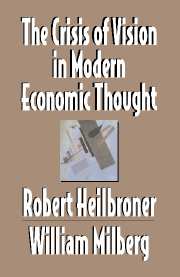4 - The Great Unraveling
Published online by Cambridge University Press: 21 November 2009
Summary
How shall we explain the decline of Keynesianism? An obvious way is to pursue the analytical tensions and inadequacies with which we have become generally familiar in our last chapter. These difficulties will have an important role to play in our subsequent discussion. But they constitute an aspect of the problem that has already been explored by many writers, to which we have nothing of significance to contribute. In examining the decline of the Keynesian consensus, we propose, therefore, to follow our theme of the interplay of vision and analysis. Analytical problematics interest us, in this study, insofar as they reflect the manner in which we construe the economic problem itself. The advent of the Keynesian classical situation clearly arose from a radical change in that construal in the face of the Great Depression. What remains to be demonstrated is that the subsequent dissolution of the Keynesian consensus also reflected changes in the existing socioeconomic conditions, and the alteration in economic vision that arose from that state of affairs.
We must therefore begin our inquiry by considering, in shorthand fashion, the historical background against which the decline of the Keynesian classical situation must be viewed. The economic consequences of the end of World War II hostilities were anticipated with considerable trepidation by the Allies. In the United States, expectations for postwar unemployment were alarming. In Great Britain, the crushing defeat of Churchill in the elections of 1945 announced a new Labour regime whose program was aimed primarily at preventing the economic dysfunctions of the prewar period. Out of similar pessimistic economic expectations, France likewise voted in a left-wing government.
- Type
- Chapter
- Information
- The Crisis of Vision in Modern Economic Thought , pp. 48 - 67Publisher: Cambridge University PressPrint publication year: 1996



